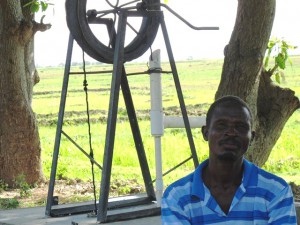What happened at the well
Oxfam’s Elizabeth Stevens recently visited Haiti to document our work on revitalizing rice farming and reducing the risk of disasters—including outbreaks of cholera.
If I had to choose one place to sit and learn about a rural town in Haiti, I’ve decided, it would have to be the community well. In places where there is no running water, the local well has a steady stream of visitors, and everyone has a story.
Even the well has a story.

On a November afternoon in the town of Atchevrot, Marchand Dessalines, my Oxfam colleagues and I crossed a rickety bridge over an irrigation channel to the place where villagers were collecting water.
Jean Jose—the man who dug the well with his machete back in 1984—joined us there, and Valeus Wislor, the engineer that Oxfam hired to fix it up last year was with us, too. The concrete cover, sand filter, hand pump, and drainage channel were his work. And gathered around the well to meet us that day were members of a team—trained by Oxfam partners from El Salvador—that is helping communities of the lower Artibonite Valley protect their water supplies from cholera bacteria and prepare for emergencies of all kinds. Read more about this program.
The team leader’s name is Philippe Merisson, and he is a middle school teacher. We learned that day that he is also a master in the Haitian martial art of stick fighting, and he told us a little about it. A stick fighter, he explained, learns to anticipate and block blows from all directions—even in the dark. Even when the stick is swapped out for a machete.
We asked him to show us a few moves, but as we stepped back to give him room, someone bumped into an elderly man at the well. I gasped, thinking he might fall onto the hard concrete and hurt himself, but he caught his balance—and then stepped forward to challenge the master.
The man who had looked so thin and frail and vulnerable a moment before turned out to be a strong, graceful, sure-footed fighter. The two sparred for a few seconds, then stopped and laughed, and the older man moved on.
Haiti has had its share of machete blows—among them, the earthquake and cholera outbreak of 2010—so perhaps the stick fighters have something to tell us about the power of alert defense. And about the extraordinary capacity of ordinary people. There is a phrase in Haiti that is used to express wonder, and as I watched the elderly man walk away down the path, it came into my mind: what you don’t know is bigger than you.